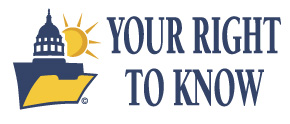March 16-22, 2025
Each year in March, news media organizations across the country take this time to highlight the importance of transparency in our government, and we underscore the vital work our journalists do to fight for access to records that shed light on government activity.
Throughout the year, PNA continues to advocate, on your behalf, for more access to essential information from all levels of government. We remain focused on the Right-to-Know Law and related transparency issues as well as ensuring that public notices remain in newspapers of general circulation.
Don’t miss this Sunshine Week training opportunity:
Wednesday, March 19 @ noon – The Sunshine Act: Pennsylvania’s Open Meetings Law – virtual

What are the Sunshine Act and Right to Know Law?
The Sunshine Act and Right to Know Law are Pennsylvania’s primary public access laws. These laws guarantee the public’s right to access government information at public meetings and through public records. Public access to meetings and records is fundamental to the public’s ability to understand government actions and hold government officials accountable.

The Sunshine Act
The Sunshine Act applies to public agencies, which include Pennsylvania executive branch agencies, the General Assembly, and municipal authorities, such as township boards of supervisors and local school boards. The Act requires agencies to hold public meetings any time a quorum deliberates agency business or takes official action. As with many laws, there are exceptions to the public meeting requirements of the Sunshine Act, but the law begins with a statement of intent, stressing the right of the public to witness the decision-making process to ensure that the democratic process functions properly.
The Right to Know Law
The Right to Know Law applies to executive branch agencies and local agencies, including school districts, townships, other municipalities, and authorities. The law also applies on a limited basis to the General Assembly and to the court system’s financial records. The law begins with the presumption that records in the possession of government agencies are public records and must be provided within the framework of the law. There are exemptions to the law that allow agencies to deny public access, but the law places the burden of proof on an agency to show why a requested record is not public.

